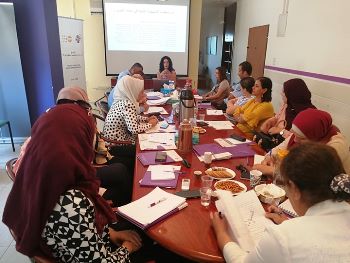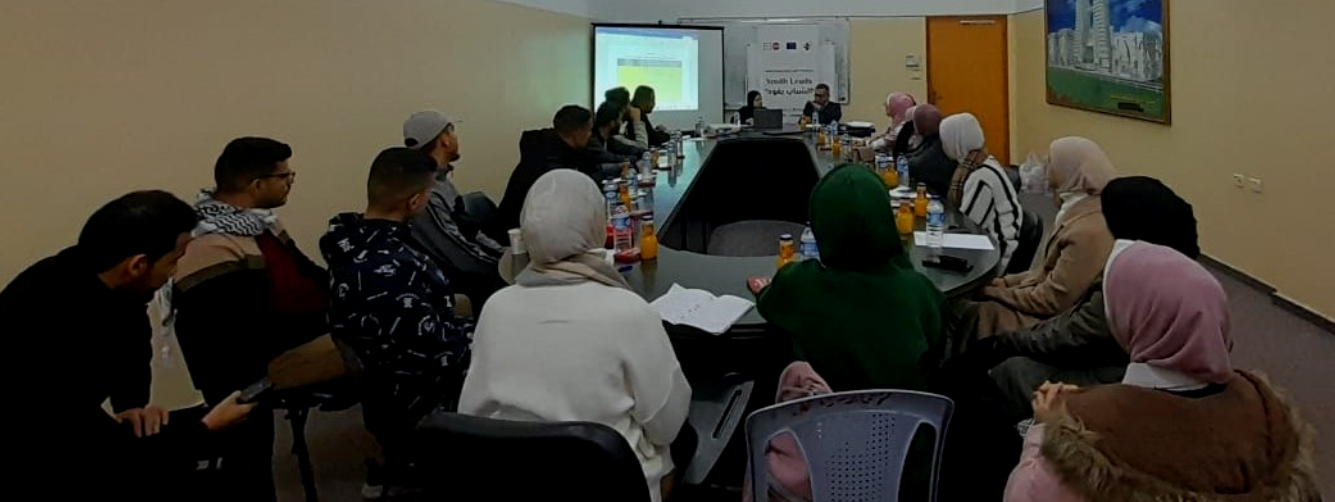
The session opened with a presentation of the survey, measuring the extent of implementation for the NRS and the challenges and gaps hindering the system’s application. The presentation was given by legal expert Fatima Da’ana, who pointed to the importance of evaluating the system, identifying the needs of battered women and comparing these with the services in the referral system within specific sectors such as health, the police or social services. Da’ana maintained that MIFTAH’s work, funded by UNFPA, including policy papers for the social, health and police sectors, helped to expose the gaps and obstacles in each sector during 2014-2015.
Da’ana pointed to the issues in the survey which battered women face and the database and information it provides on the institutions for protecting these women. She also said the survey helped institutions working with battered women and security and social, health and economic sectors to formulate plans, programs and projects that contribute to raising the competencies of individuals who these women turn to. “The basic goal of the NRS as a nationally adopted mechanism is to achieve protection and rehabilitation for women victims of violence and to support the health, social and legal sectors with important interventions based on integration and distribution of roles. This will guarantee the provision of just gender social, health, and legal services in addition to their implementation through a partnership and effective integrative professionalism. Moreover, the referral system safeguards the right of self-determination, privacy and confidentiality for women and preserves the freedom and security of the beneficiary and the right to access information pertaining to their cases,” Da’ana said.
Da’ana then presented the recommendations and necessary interventions based on MIFTAH’s policy papers in order to follow-up on the implementation of the referral system. She said the system could not be applied, or a program set up for it, without conducting general reforms to the justice and legal system and to relevant institutions in general and without taking into consideration several of the recommendations and required interventions from the health, social, police/justice sectors and the Ministry of Women’s Affairs, individually in addition to general and joint recommendations. These include: continuing to work towards amending all laws that discriminate against battered women, disseminating information on the NRS for battered women by all ministries, developing policies and laws in all sectors through developing clear and specific protocols to deal with battered women who seek services; building an action plan that deals with nationalizing and institutionalizing the system in the plans of all relevant official parties, and including it in the executive plan of each ministry; stressing on the necessity to involve service-providers in all sectors in capacity-building and awareness activities on the system; allocating the necessary budgets, human resources and funding for implementing the law; working towards implementing recommendations pertaining to general national policies and follow-up carried out by MIFTAH; providing the logistics and infrastructure necessary to receive cases and provide them with the necessary services with guaranteed privacy and confidentiality; to work towards automating referral system forms and a database for all sectors, to unify them and adopt an electronic system as an official means of communication and to formulate follow-up and evaluation programs for cases.
The survey results were followed by discussions and presentations from representatives of the different official and nonofficial sectors involved in the referral system. They all called for identifying the achievements made by each sector and the need to integrate approaches and procedures, to formulate unified policies, and monitor the gaps in the system.
The presentations also reaffirmed the need for continued work on the system whether in terms of its institutionalization, training or services. They stressed on: protection for service providers, focusing on automation and computerization since this new process requires special skills; the need to unify the concepts, language and institutionalization within the various sectors; working on laws as one package instead of dealing with them separately so as to bridge any gaps; and focusing on the largest possible number of battered cases in the various districts. Furthermore, one of the presentations called for a review of the referral system in terms of its responsiveness to the needs of disabled women and the need to train and enable social counselors at the Ministry of Social Development on the use of “case conference” jurisdictions and to adopt principles of combatting violence in the public sector. They also called for periodic evaluation of the level and quality of provided services.
The presentations also called for closing the gaps in partnership between the public and civil sectors through expanding the level of partnership between the two sides, by adding new partners, by not marginalizing any sector, through developing a procedure guidebook that takes into consideration the reality in which battered women live and how the violence they are subjected to is dealt with; finally by setting up an electronic referral system connected to all the partners.









